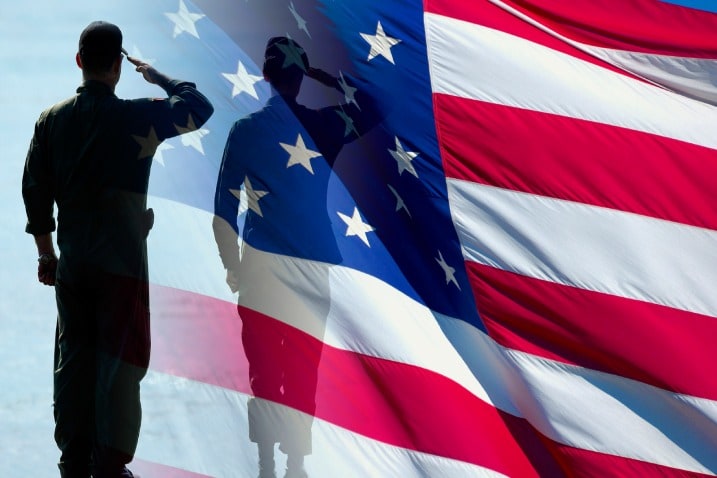In one particularly brazen scheme, car salesmen from dealerships near Camp Lejeune, the largest Marine Corps base on the East Coast, actually came onto the base and pretended to be warning young Marine recruits about shady car-sales tactics.
But they were actually employing a trick called "bird-dogging," in which they referred the servicemen to car salesmen who then took advantage of them. In other cases, servicemen were verbally assaulted, threatened and even held at dealerships until they signed sales documents. Their trade-in vehicles disappeared or were not credited on sales contracts, according to the memo.
It's true that any good salesperson will look for common ground or conversation points to warm up a potential customer. But when a car salesman praises service members while preparing to hand them a raw deal, it is nothing more than "military sales rhetoric," says Robert "Camo" Gleisberg, a retired Marine lieutenant colonel and a community education officer for Pacific Marine Credit Union. Gleisberg teaches a car-buying class at Camp Pendleton, the Marine Corps base near Oceanside, California, which has a daytime population of 70,000 military and civilian personnel.
An unscrupulous salesman will wave the flag to lower the Marine's resistance to the sales pitch, he says. "I tell them, 'Don't be fooled by this — if you don't like the numbers you need to walk out.'" Tips from Gleisberg and others financial educators can be found in "Boot Camp for Military Car Buyers."
Gleisberg understands firsthand the vulnerability of young Marines, who oftentimes have money for the first time in their lives. Years ago, when he returned from a tour of duty in Vietnam, he was eager to buy a 1976 Mercedes-Benz 450SL. But his father, an attorney, told him to get price quotes from three different dealerships rather than "walking on the car lot with a wad of bills sticking out of my pockets." Later, Gleisberg became a car salesman and learned much of what he uses in his classes today.
Craig Hughes, an accredited financial counselor at Marine Corps Air Station Miramar, tells young military car buyers: "Don't fall in love with the car. Be prepared to do an about-face if you don't like what you're hearing."
Hughes points out that the military has formal and informal counseling and mentoring programs to prevent Marines from stumbling into financial disaster.
"Take the contract and have it reviewed by an officer," Hughes says. And if the salesman and dealership don't allow this, "You probably shouldn't be doing business with them anyway."
The San Diego Better Business Bureau sees a fair number of complaints about how the military is treated, given its proximity to several bases in the area. Sheryl Bilbrey, the San Diego bureau's CEO, says her office gets more complaints about used-car lots than the new-car dealerships. But in all cases, she says the bureau's goal is to provide "pre-information" by letting shoppers know how these businesses handle complaints. "We want to let them know who the good guys are," she says.
In some cases, Bilbrey says, servicemen are thrown into debt by poor car-buying decisions that were so pronounced that they put their careers in jeopardy. When service members have outstanding debt, their superior officers are notified and sometimes their security clearance is revoked.
"A lot of these guys are so young," she says. "They have their first steady paycheck, they get excited about buying the vehicle and they don't know that there are people out there who will take advantage of them."
In one case, a young Marine traded in a car on which he still owed money, Bilbrey recalls. The dealer sold him a new car but didn't pay off the trade-in's loan, leaving him with two car payments.
On the national BBB Web site it's easy to check the rating of any local business. A review of car dealerships in Oceanside, California, showed that several have "D" ratings and at least one major dealership has an "F" rating. The Utah Infiniti dealership that attempted to pressure the Air Force reserve sergeant into buying a G37x has an "F" grade.
"That 'F' rating is hard to earn," Bilbrey says. "And it is earned. We don't give it out lightly."
Several car dealers contacted by Edmunds in the Oceanside area, which is adjacent to the massive Camp Pendleton Marine Corps base, didn't return phone calls. Speaking off the record, however, a spokesman for one dealership that had earned an "A" rating from the local Better Business Bureau says that it strives to treat Marines right. "We have a strong relationship with the Marines at Camp Pendleton," he says. The spokesman says a lot of the dealership's business comes from the base and "we try to return the favor" by giving away one free car a year to someone in the military.
With Petraeus' call to action and more service members returning from overseas, the problem is likely to continue getting attention. In the meantime, servicemen and servicewomen need to keep their guard up, says Rosemary Shahan, president of Consumers for Auto Reliability and Safety, a California-based advocacy group.
She says that consumer advocates have a joke about dealerships that fly American flags and post "Welcome Military" signs: The bigger the flag, the worse their practices.
